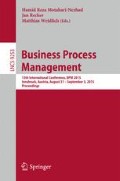Abstract
Business processes are prone to continuous and unexpected changes. Process workers may start executing a process differently in order to adjust to changes in workload, season, guidelines or regulations for example. Early detection of business process changes based on their event logs – also known as business process drift detection – enables analysts to identify and act upon changes that may otherwise affect process performance. Previous methods for business process drift detection are based on an exploration of a potentially large feature space and in some cases they require users to manually identify the specific features that characterize the drift. Depending on the explored feature set, these methods may miss certain types of changes. This paper proposes a fully automated and statistically grounded method for detecting process drift. The core idea is to perform statistical tests over the distributions of runs observed in two consecutive time windows. By adaptively sizing the window, the method strikes a trade-off between classification accuracy and drift detection delay. A validation on synthetic and real-life logs shows that the method accurately detects typical change patterns and scales up to the extent that it works for online drift detection.
Access this chapter
Tax calculation will be finalised at checkout
Purchases are for personal use only
Preview
Unable to display preview. Download preview PDF.
References
Bose, R.P.J.C., van der Aalst, W.M.P., Žliobaitė, I., Pechenizkiy, M.: Handling concept drift in process mining. In: Mouratidis, H., Rolland, C. (eds.) CAiSE 2011. LNCS, vol. 6741, pp. 391–405. Springer, Heidelberg (2011)
Carmona, J., Gavaldà, R.: Online techniques for dealing with concept drift in process mining. In: Hollmén, J., Klawonn, F., Tucker, A. (eds.) IDA 2012. LNCS, vol. 7619, pp. 90–102. Springer, Heidelberg (2012)
Bose, R.J.C., van der Aalst, W.M., Zliobaite, I., Pechenizkiy, M.: Dealing with concept drifts in process mining. IEEE Transactions on NNLS 25(1), 154–171 (2014)
Martjušev, J.: Efficient algorithms for discovering concept drift in business processes. Master’s thesis, University of Tartu (2013)
Accorsi, R., Stocker, T.: Discovering workflow changes with time-based trace clustering. In: Aberer, K., Damiani, E., Dillon, T. (eds.) SIMPDA 2011. LNBIP, vol. 116, pp. 154–168. Springer, Heidelberg (2012)
Burattin, A., Sperduti, A., van der Aalst, W.M.: Control-flow discovery from event streams. In: 2014 IEEE Congress on Evolutionary Computation (CEC), pp. 2420–2427. IEEE (2014)
Gama, J., Žliobaitė, I., Bifet, A., Pechenizkiy, M., Bouchachia, A.: A survey on concept drift adaptation. ACM Computing Surveys (CSUR) 46(4) (2014)
Hidders, J., Dumas, M., van der Aalst, W.M., ter Hofstede, A.H., Verelst, J.: When are two workflows the same? In: Proc. of CATS, pp. 3–11. Australian Computer Society (2005)
van Glabbeek, R., Goltz, U.: Equivalence notions for concurrent systems and refinement of actions. In: Kreczmar, A., Mirkowska, M. (eds.) Mathematical Foundations of Computer Science 1989. LNCS, vol. 379, pp. 237–248. Springer, Heidelberg (1989)
van der Aalst, W.: Process Mining: Discovery, Conformance and Enhancement of Business Processes. Springer (2011)
van der Aalst, W.M.P., Weijters, T., Maruster, L.: Workflow mining: discovering process models from event logs. IEEE TKDE 16(9), 1128–1142 (2004)
de Medeiros, A.K.A., van der Aalst, W.M.P., Weijters, A.J.M.M.T.: Workflow mining: current status and future directions. In: Meersman, R., Schmidt, D.C. (eds.) CoopIS 2003, DOA 2003, and ODBASE 2003. LNCS, vol. 2888, pp. 389–406. Springer, Heidelberg (2003)
Wen, L., van der Aalst, W.M., Wang, J., Sun, J.: Mining process models with non-free-choice constructs. Data Mining and Knowledge Discovery 15(2) (2007)
Cook, J.E., Wolf, A.L.: Event-based detection of concurrency. In: Proc. of FSE (1998)
Nuzzo, R.: Statistical errors. Nature 506(13), 150–152 (2014)
Ho, S.S.: A martingale framework for concept change detection in time-varying data streams. In: Proc. of ICML, pp. 321–327. ACM (2005)
Murphy, J.J.: Technical analysis of the financial markets: A comprehensive guide to trading methods and applications. Penguin (1999)
Bifet, A., Gavalda, R.: Learning from time-changing data with adaptive windowing. In: SDM, vol. 7. SIAM (2007)
Wilcox, A.R.: Indices of qualitative variation. Technical report, Oak Ridge Nat. Lab (1967)
Dumas, M., La Rosa, M., Mendling, J., Reijers, H.: Fundamentals of Business Process Management. Springer (2013)
Weber, B., Reichert, M., Rinderle-Ma, S.: Change patterns and change support features-enhancing flexibility in process-aware information systems. DKE 66(3), 438–466 (2008)
Yates, D., Moore, D., Starnes, D.S.: The practice of statistics: TI-83/89 Graphing Calculator Enhanced. Macmillan (2007)
Armas-Cervantes, A., Baldan, P., Dumas, M., García-Bañuelos, L.: Behavioral comparison of process models based on canonically reduced event structures. In: Sadiq, S., Soffer, P., Völzer, H. (eds.) BPM 2014. LNCS, vol. 8659, pp. 267–282. Springer, Heidelberg (2014)
Author information
Authors and Affiliations
Corresponding author
Editor information
Editors and Affiliations
Rights and permissions
Copyright information
© 2015 Springer International Publishing Switzerland
About this paper
Cite this paper
Maaradji, A., Dumas, M., La Rosa, M., Ostovar, A. (2015). Fast and Accurate Business Process Drift Detection. In: Motahari-Nezhad, H., Recker, J., Weidlich, M. (eds) Business Process Management. BPM 2016. Lecture Notes in Computer Science(), vol 9253. Springer, Cham. https://doi.org/10.1007/978-3-319-23063-4_27
Download citation
DOI: https://doi.org/10.1007/978-3-319-23063-4_27
Published:
Publisher Name: Springer, Cham
Print ISBN: 978-3-319-23062-7
Online ISBN: 978-3-319-23063-4
eBook Packages: Computer ScienceComputer Science (R0)

